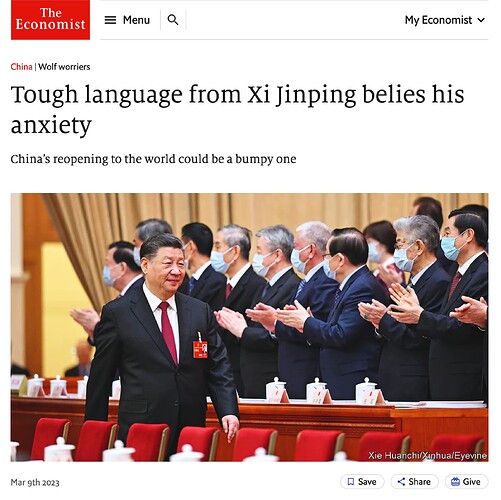-
在中国议会的年度会议上,习近平主席指责美国带领西方国家对中国进行 "全面遏制、包围和压制 "的运动。即将离任的总理李克强为中国今年的经济增长设定了一个出乎意料的谨慎目标。
-
习近平是中国的总忧虑者,共产党在2020年出版的一本251页的书中包含了他关于恐怖主义和 "颜色革命 "等话题的演讲片段。他长期以来一直担心西方国家正试图 "西化和分裂 "中国。
-
中国领导人警告说,由于与西方国家的紧张关系加剧,新冠疫情之后对世界的重新开放可能是一个坎坷的过程。他们强调需要谨慎和警觉,以保护国家的利益。
-
在全国人民代表大会的一次会议上,中国国家主席习近平打破惯例,对美国主导的遏制中国的努力对中国的发展构成 "前所未有的严重挑战 "表示关切。他的外交部长秦刚甚至更直接,警告说 “如果美国不踩刹车,肯定会有冲突和对抗”。
-
尽管言辞激烈,但中国官员并没有对美国发出任何明确的威胁,在双边关系中最有争议的问题–台湾问题上坚持使用模糊的语言。中国的国防开支今年计划增长7.2%,但他们在国内生产总值中的份额将基本保持不变。
-
李克强总理在全国人大的告别演说中说,武装部队应 “全面加强军事训练和准备”,并 “促进两岸关系和平发展”。
-
中国领导人不希望与西方国家的紧张关系升级,并利用人大会议向企业家发出令人放心的信号。
-
习近平强调了党需要加强控制,同时也赞扬了私营经济。
-
李克强总理在全国人大的讲话中没有提到 "共同富裕 "一词,因为这个词与对亿万富翁及其公司的严厉处理有关。
-
习近平的书名为《习近平关于防范风险挑战、应对突发事件论述摘编》,其中充满了加强党的控制的建议。
-
代表们正计划就重组一些政府部委的计划进行表决,这将使党对重要的工作领域有更多的控制。
-
这位高级官员说,调整的原因之一是 “外部遏制和压制的严峻形势”。
-
习近平呼吁在面对国际和国内环境的 "深刻而复杂的变化 "时要保持冷静。
-
他还强调了来自西方的威胁,例如美国努力限制中国获得尖端技术。
-
私营企业对恢复增长至关重要,因为它们占国内生产总值的五分之三。
-
全国人大最重要的任命将是任命新总理李强,他是前上海市委书记和习近平先生的门徒。
-
李强因监督新冠疫情风控事件导致的两个月的封锁而受到上海许多人的反感,但商界人士对他的看法更为积极。
-
李强是在12月突然结束 "动态清零 "政策的幕后推手,并抵制了习近平要求放缓重新开放的压力。
-
被选中在李强手下处理经济事务的人也将受到密切关注。
-
许多被提名担任高级职位的人对西方国家的经验远远少于他们的前任,这可能是由于西方国家联合起来反对习先生。
-
全国人大还将宣布再次确认习近平先生为主席。
-
这是一个不可避免的结果,将在3月10日宣布。
-
At the annual session of China’s parliament, President Xi Jinping accused America of leading Western countries in a campaign of “all-out containment, encirclement and suppression” against China. The outgoing prime minister, Li Keqiang, set an unexpectedly cautious target for China’s economic growth this year.
-
Mr Xi is China’s worrier-in-chief, and a 251-page book published by the Communist Party in 2020 contains snippets from his speeches about topics such as terrorism and “colour revolutions.” He has long been worried that Western countries are attempting to “Westernise and split” China.
-
China’s leaders are warning that the post-COVID reopening to the world could be a bumpy one, due to increased tensions with Western countries. They are emphasizing the need for caution and vigilance in order to protect the country’s interests.
-
At a meeting of the National People’s Congress, Chinese President Xi Jinping broke from custom to express concerns that American-led efforts to contain China posed “unprecedented severe challenges” to the country’s development. His Foreign Minister, Qin Gang, was even more direct, warning that “if the United States does not hit the brake, there will surely be conflict and confrontation.”
-
Despite the strong rhetoric, Chinese officials have not made any explicit threats against America and have stuck to ambiguous language on the most contentious issue in the bilateral relationship, Taiwan. China’s defense spending is planned to grow by 7.2% this year, but their share of GDP will remain largely unchanged.
-
In his farewell speech to the NPC, Premier Li Keqiang said that the armed forces should “intensify military training and preparedness across the board” and “promote the peaceful development of cross-strait relations.”
-
Chinese leaders do not want to escalate tensions with the West, and are using the NPC to send reassuring signals to entrepreneurs.
-
Xi Jinping has emphasised the need for the party to tighten its grip, while also praising the private economy.
-
Prime Minister Li has not mentioned the term “common prosperity” in his speech to the NPC, which is associated with heavy-handed treatment of billionaires and their firms.
-
Xi’s book, titled “Excerpts from Xi Jinping’s Talks on Guarding Against Risks and Challenges and Responding to Emergencies” is replete with recommendations to tighten the party’s grip.
-
Delegates are planning to vote on a plan for restructuring some government ministries, which will give the party more control over vital areas of work.
-
The senior official said that one reason for the shake-up was “the severe situation of…external containment and suppression”.
-
Xi has called for calm in the face of “profound and complex changes” in the international and domestic environments.
-
He has also emphasised threats from the West, such as America’s efforts to limit Chinese access to cutting-edge technologies.
-
Private firms are crucial to revive growth, as they contribute three-fifths of GDP.
-
The most important appointment at the NPC will be the naming of a new Prime Minister, Li Qiang, who is a former party chief of Shanghai and protégé of Mr. Xi
-
Li Qiang is disliked by many in Shanghai for overseeing the two-month lockdown due to COVID-19, but is viewed more positively by businesspeople
-
Li Qiang was behind the sudden ending of the “zero-covid” policy in December and resisted pressure from the President to slow the reopening
-
The people chosen to work under Mr. Li on economic matters will also be closely watched
-
Many of those slated for top posts have far less experience of the West than their predecessorsThis may be due to the West ganging up against Mr. Xi
-
The NPC will also announce the reconfirmation of Mr. Xi as President
-
This is an inevitable outcome and will be announced on March 10th
